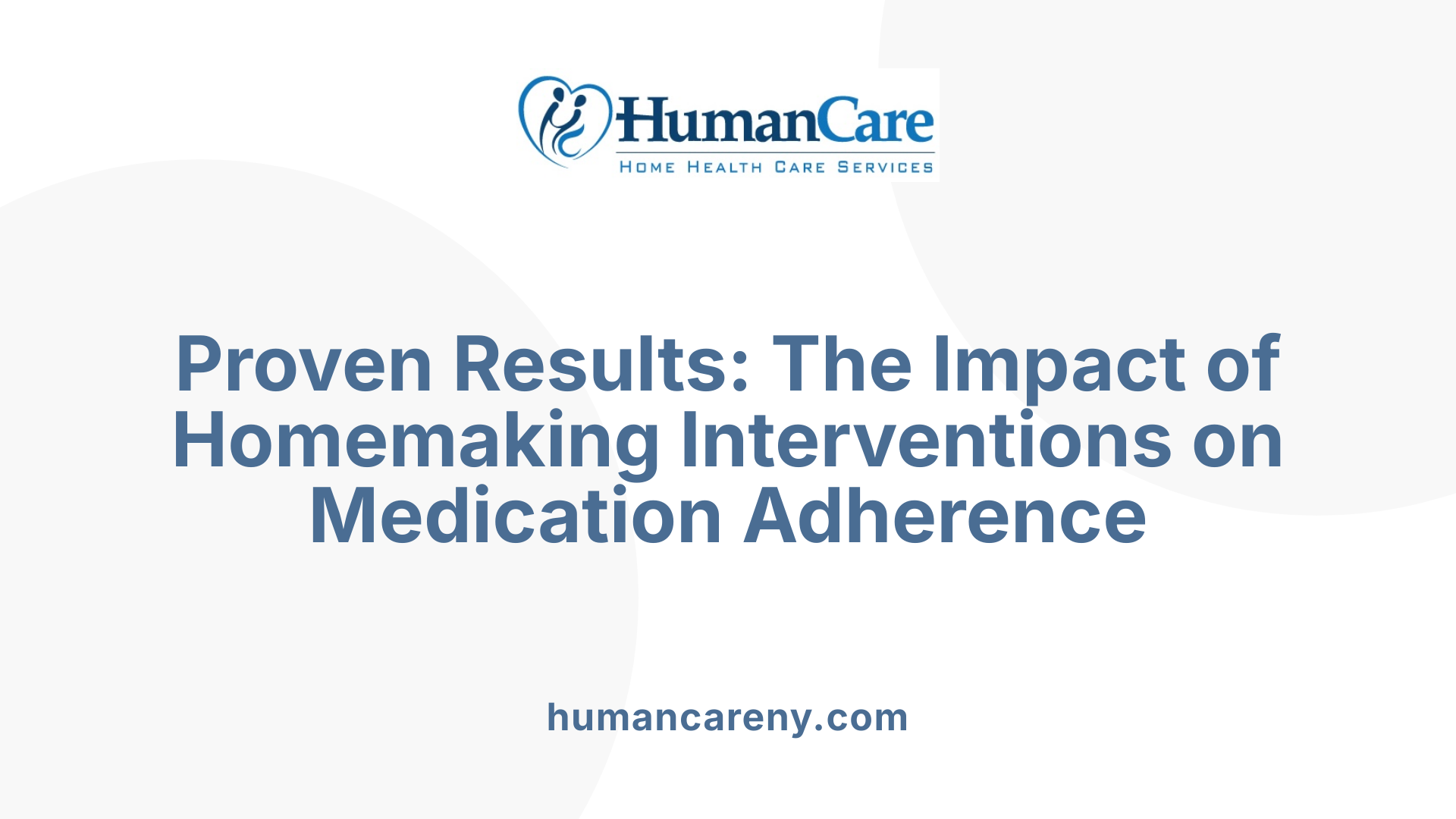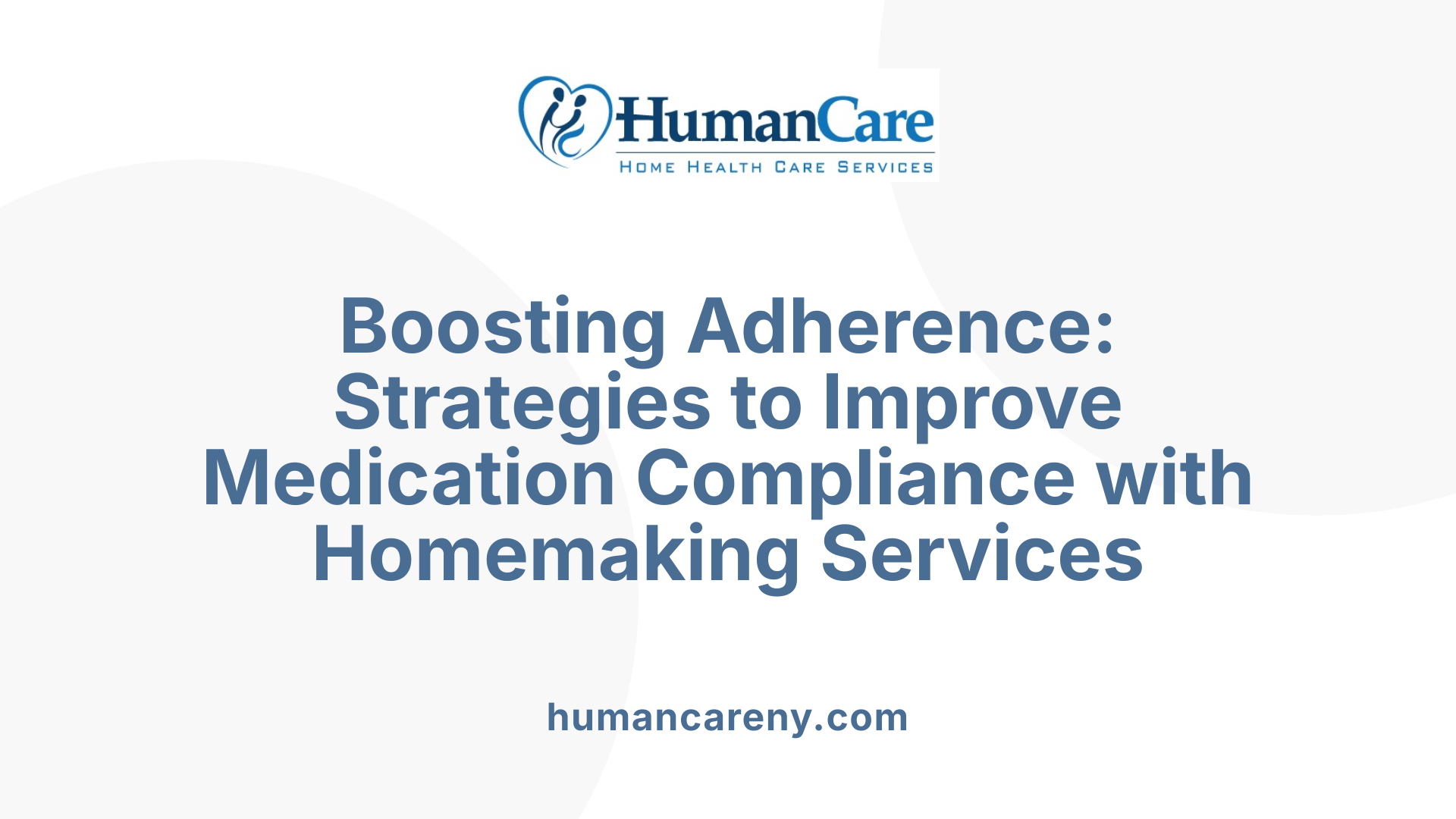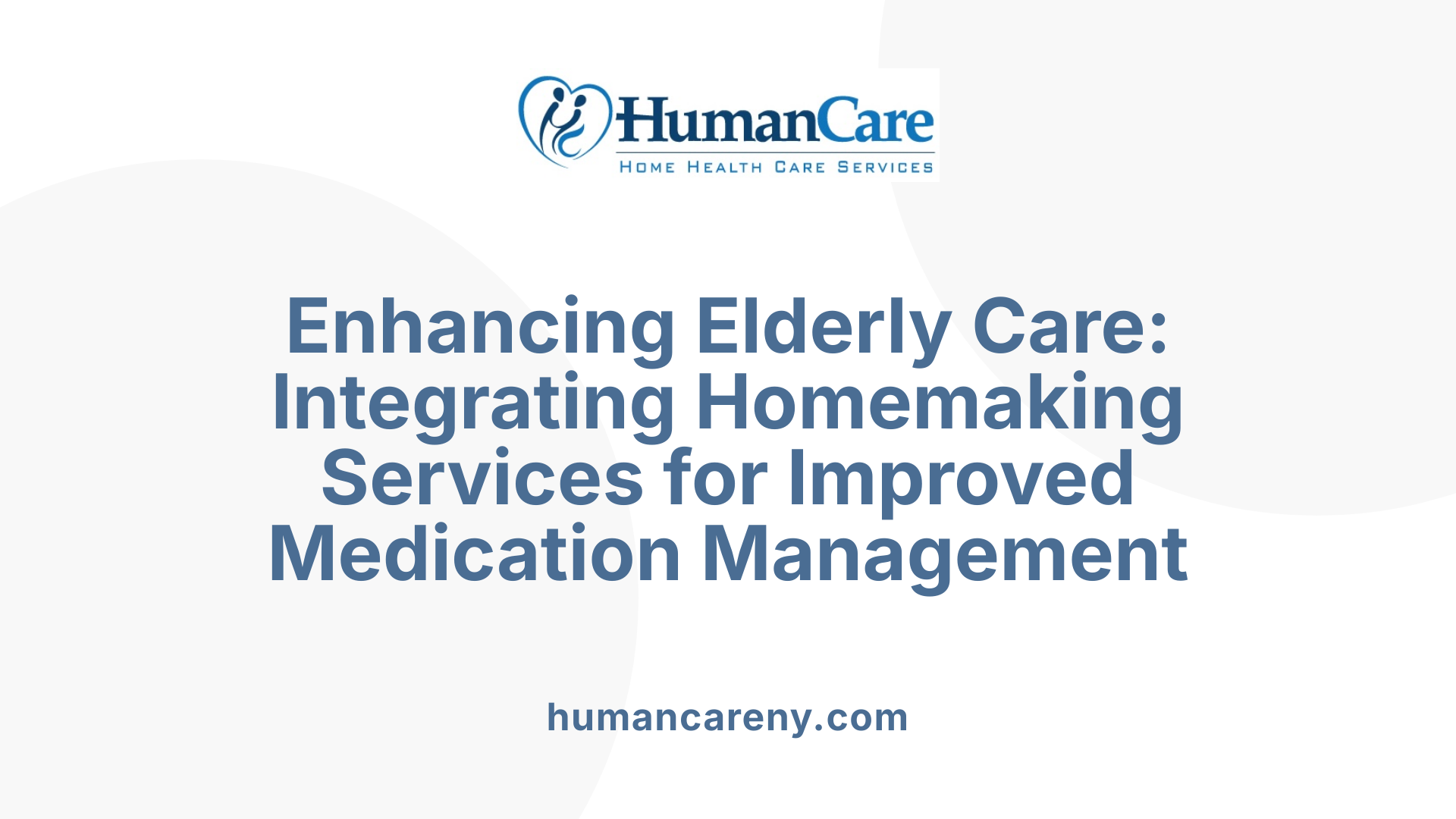Understanding the Importance of Medication Adherence in the Elderly
Medication adherence is crucial for managing chronic illnesses and maintaining health among older adults. However, non-adherence remains a significant challenge, leading to increased health complications, hospitalizations, and healthcare costs. Homemaking services, as a component of in-home care, offer vital support to overcome barriers and promote consistent medication use among seniors.
Impact of Homemaking Services on Elderly Medication Adherence
How do homemaking services influence medication adherence among the elderly?
Homemaking services play a crucial role in improving medication adherence for older adults, especially those managing chronic health conditions. These services provide practical support by assisting with daily medication routines, such as organizing pills in pillboxes, setting reminders, and helping patients follow prescribed schedules. This hands-on assistance reduces the chances of missed doses, which can lead to health deterioration.
Caregivers involved in homemaking often support elderly patients with cognitive impairments, including dementia, by simplifying medication management. They can help address challenges related to side effects, correct timing, and maintaining consistency, which are common barriers to adherence. Support from healthcare professionals, like home care nurses, further enhances this process. They offer personalized counseling, recommend aids like weekly pill organizers, and help establish effective communication channels for addressing adherence issues.
Training caregivers about the importance of medication adherence and disease management boosts their effectiveness, fostering better health outcomes. Combining homemaking services with professional interventions and educational programs creates a comprehensive support system that significantly boosts adherence. This integrated approach ensures that older adults are more likely to follow their medication regimens correctly, reducing the risk of complications and improving overall health.
Mechanisms of Homemaking Support in Promoting Medication Compliance
What mechanisms do homemaking services use to support elderly medication adherence?
Homemaking and home care services employ a variety of practical strategies to enhance medication adherence among older adults. These include organizing medications using tools such as pillboxes, medication lists, and wall calendars, which help seniors manage complex regimens and remember dosing schedules.
Verbal and direct reminders are also common. Homemakers may provide gentle prompts during visits to ensure medications are taken on time. They often assist with the physical handling of medications, addressing physical difficulties like arthritis or poor vision that could impede proper administration.
A crucial role of homemakers involves observing medication-taking behaviors during visits. If non-adherence is detected, they can address underlying issues and communicate with healthcare providers to resolve medication-related problems.
Explaining the importance of consistent medication intake helps foster better self-management and builds trust. Homemakers act as a bridge, ensuring seniors understand their medication instructions and are motivated to adhere.
Many services coordinate with physicians or pharmacists to confirm medication details, facilitate timely refills, and conduct routine medication reviews. This cooperation supports regimen optimization and reduces risks of drug interactions.
Beyond medication management, homemakers also provide emotional and social support, reducing feelings of isolation that can negatively impact adherence. Regular visits and active engagement reassure older adults, encouraging consistent medication routines.
Overall, the combination of organizing tools, supportive communication, coordination with healthcare providers, and emotional support constitutes the core mechanisms through which homemaking services promote medication compliance in the elderly.
Evidence Supporting Homemaking Interventions for Better Medication Outcomes

What evidence exists on the effectiveness of homemaking services in improving medication adherence for seniors?
Research and case studies consistently suggest that homemaking and home care interventions can play a significant role in enhancing medication adherence among elderly individuals. These services typically include assistance with medication management, personal support, and health education, which collectively contribute to better health outcomes.
Participants who receive homemaking support often report improved self-management skills and greater communication with healthcare providers. For example, pharmacist-led home visits have shown notable improvements in medication adherence and knowledge. Tailored educational support during such visits helps address common barriers like low health literacy and mismanagement.
These interventions can involve practices such as organizing medications, providing clear instructions, and fostering supportive relationships between caregivers and seniors. Such support has been linked to fewer missed doses and more consistent medication routines.
However, the success of homemaking services can depend on various factors. These include the timing of intervention, caregiver training levels, and the specific storage practices promoted. When home visits are combined with effective communication and education strategies, they tend to show greater effectiveness.
Overall, evidence indicates that homemaking and home care services hold promise for improving medication adherence in elderly populations. While results are encouraging, the impact varies based on implementation details and individual patient circumstances.
| Study/Case | Main Focus | Results & Effectiveness | Reference |
|---|---|---|---|
| Pharmacist home visits | Medication knowledge & adherence | Significant improvements, tailored education effective | [Studies on pharmacist interventions] |
| General home care support | Medication management & communication | Improved self-management, open communication | [Various case studies] |
| Timing & training factors | Implementation impact | Variability in success depending on timing and training | [Research findings] |
These findings highlight the importance of personalized, well-structured homemaking interventions in supporting medication adherence among older adults.
Supporting Elderly Medication Regimens Through Homemaking Assistance

How can homemaking support help elderly individuals follow their prescribed medication regimens?
Homemaking support plays a vital role in improving medication adherence among older adults. By assisting with daily routines and ensuring medications are stored in accessible, organized, and safe locations, caregivers can make medication management simpler for seniors. For instance, placing medications in clear, visible spots like nightstand drawers or atop bedroom furniture ensures they are easy to find and reach.
Reminders are crucial components of homemaking support. Visual cues, alarms, or specially designed pill organizers can help reduce forgetfulness, especially for seniors living alone or experiencing cognitive decline. Consistent cues can significantly lessen missed doses and improve health outcomes.
Healthcare professionals can provide tailored advice on optimal medication storage. Recommendations usually emphasize safety—such as childproof containers—and visibility, to facilitate adherence. Family members and social networks also influence medication routines positively; encouragement and oversight from loved ones can motivate consistent use.
Integrating technology into home environments further boosts adherence. Electronic medication dispensing systems or reminder devices can prompt correct medication times and verify intake, adding an extra layer of support.
Overall, a combination of modifications to living spaces, personalized cues, social support, and advanced technology creates a multifaceted approach. This strategy addresses common barriers like forgetfulness, confusion, and physical limitations, ultimately supporting elderly individuals to manage their medications effectively.
Strategies to Boost Medication Adherence via Homemaking Services

What strategies involving homemaking services can enhance medication adherence in seniors?
Homemaking services are playing an increasingly important role in supporting medication adherence among older adults. These services offer personalized assistance, helping seniors organize and manage their medications more effectively.
A primary approach is providing tailored support, such as helping to coordinate medication schedules. Homemakers can assist in creating simple, clear routines and ensuring medications are stored in accessible, safe places. This reduces the risk of missed doses due to forgetfulness or difficulty handling medication containers.
Furthermore, homemaking services can facilitate communication between seniors and healthcare providers. For example, they can help set up reminder systems like phone calls, text messages, or mailed notices. These alerts serve as effective prompts, especially for seniors who may struggle with memory or health literacy.
Education is another vital component. Homemakers can deliver essential information about medication regimens, potential side effects, and the importance of adherence. This is often achieved through one-on-one interactions or community outreach programs, empowering seniors and their caregivers with knowledge.
Safety is also a key concern. Homemaking services assist in monitoring proper medication administration, aiding residents with physical challenges such as arthritis or visual impairments. They can ensure correct dosages, proper handling, and assess any side effects or adverse reactions, particularly in residents with cognitive decline.
In-home support from homemakers creates a trusted environment where healthcare providers can observe challenges firsthand. This direct observation enables tailored interventions, improves compliance, and encourages ongoing engagement with medication routines.
Overall, these strategies leverage the personal touch of homemaking services to improve medication-taking behavior, ultimately leading to better health outcomes and reduced hospitalizations among elderly populations.
The Role of Digital and Technological Support in Medication Compliance
How can technology enhance medication adherence among the elderly supported by homemaking services?
Technology offers numerous avenues to improve medication adherence in older adults, especially when complemented by homemaking services. Digital medication management systems, reminder applications, and tele-pharmacy have emerged as effective tools that can bridge gaps caused by physical, cognitive, or systemic barriers.
Digital medication management systems, such as electronic dispensers and wearable devices, automate reminders, confirm medication intake, and record adherence data. For example, systems like the Medication Adherence Management System (MAMS) integrate voice interaction with companion robots and wearable sensors, ensuring timely medication reminders and capturing compliance information. These records help caregivers and healthcare professionals monitor adherence and intervene when necessary.
Reminder apps tailored for seniors feature simple interfaces, visual cues, and alert sounds to prompt medication doses. They may include educational resources to enhance understanding of each medication’s purpose, which is particularly helpful for those with low health literacy. Features such as calendar views, dosage logs, and motivational alerts foster a sense of control and routine among elderly users.
Tele-pharmacy extends the reach of healthcare providers by enabling remote consultations, medication reviews, and support. It uses various communication channels such as video calls, secure messaging, and electronic prescriptions. For seniors with chronic diseases like hypertension or diabetes, tele-pharmacy facilitates ongoing medication management, ensuring correct dosages and addressing side effects promptly.
Wearable devices and interactive robots like the ASCCBot add an engaging dimension to adherence routines. These tools can provide visual and auditory prompts, monitor medication history, and even offer emotional support, making the experience less burdensome and more comforting.
When integrated with homemaking services, these technologies create a comprehensive support environment. Caregivers can access adherence data, receive alerts for missed doses, and assist with technological interfaces when needed. This synergy ensures that seniors are supported physically and emotionally in maintaining their medication schedules.
In conclusion, employing digital tools in collaboration with homemaking services addresses many challenges faced by the elderly, including forgetfulness, misunderstandings about medications, and physical difficulties. The combination of automated reminders, remote healthcare access, and interactive support makes medication routines more manageable, ultimately leading to better health outcomes and enhanced quality of life for older adults.
Challenges and Limitations in Homemaking-Based Adherence Support

What are the limitations of homemaking services in improving medication adherence among seniors?
Homemaking services provide valuable assistance to older adults in managing their medications, but several hurdles can limit their effectiveness. One major issue involves patient-specific barriers. Many seniors face cognitive decline, low health literacy, or physical challenges such as impaired vision or dexterity, which can hinder their ability to follow medication routines even with homemaking support.
Systemic factors also play a significant role. For instance, inconsistency in visit schedules or limited training of homemakers may lead to gaps in medication management. Communication breakdowns between homemakers and healthcare providers can result in misaligned advice or missed updates about medication changes.
Furthermore, the increasing reliance on technology-based tools, such as digital reminders or electronic medication management systems, may not be suitable for all seniors, especially those with sensory impairments or limited familiarity with digital devices. These barriers diminish the potential benefits of technology-dependent interventions.
Long-term sustainability represents another concern. Funding limitations, resource allocation, and availability of trained caregivers can fluctuate over time, affecting the consistency of homemaking services. Additionally, individual preferences, socio-economic status, and cultural factors influence a senior's willingness to engage with these services, highlighting the need for personalized approaches.
In summary, while homemaking services are beneficial, their impact on medication adherence can be limited by a combination of patient-specific challenges, systemic issues within healthcare delivery, and sustainability concerns. Addressing these limitations requires tailored, flexible, and resource-efficient strategies to optimize medication support for elderly populations.
Conclusion: Integrating Homemaking Services into Elderly Care for Better Outcomes

How can homemaking services be integrated effectively into elderly care to improve medication adherence?
Effective integration of homemaking services into elderly care is essential for improving medication adherence and overall health outcomes. This requires a broad, multidisciplinary strategy that combines practical support, healthcare expertise, and technological innovations.
Homemakers and caregivers should receive training on medication management, including proper storage, routine monitoring, and recognizing barriers to adherence. This education ensures they can support elderly individuals in maintaining their medication schedules safely and effectively.
Coordination with healthcare professionals is crucial. Regular communication between homemakers, physicians, pharmacists, and nurses ensures timely medication reviews, personalized adjustments, and addressing any complexities related to polypharmacy.
Technology plays a significant role. Digital reminders, medication management systems like MAMS, and mobile health apps can support adherence through timely alerts and easy access to medication information.
Creating a supportive environment involves active engagement among family members, caregivers, healthcare teams, and community organizations. Building trust and facilitating open communication help elderly individuals feel involved in their care, boosting motivation and adherence.
What role do multidisciplinary collaboration and technology play in this integration?
Collaboration among various healthcare providers fosters comprehensive care planning, ensuring medication regimens are appropriate and manageable. This team approach reduces medication errors and supports ongoing adherence.
Technological innovations such as electronic medication reminders, wearable devices, and tele-pharmacy services provide additional layers of support. They help overcome barriers like forgetfulness, low health literacy, and accessibility issues.
What are future directions for integrating homemaking services into elderly medication management?
Future initiatives should focus on developing personalized interventions tailored to individual health statuses, cultural backgrounds, and social circumstances. Advancements in digital health—including AI-driven alerts and smart medication dispensing devices—will further enhance adherence.
Policy support and funding are vital to sustain and expand home-based care models. Implementing standardized training programs for homemakers and caregivers, coupled with continuous technological upgrades, will help build resilient systems.
Research should also aim to evaluate long-term outcomes of integrated care models, emphasizing patient satisfaction, healthcare cost reduction, and health status improvements.
By adopting a holistic approach that combines practical support, professional healthcare input, and innovative technology, we can significantly improve elderly medication adherence. This integration not only enhances individual health but also reduces the burden on healthcare systems, fostering healthier aging populations.
| Aspect | Details | Additional Information |
|---|---|---|
| Support Strategies | Training homemakers, medication storage, adherence recognition | Ensures safe, consistent medication routines |
| Healthcare Collaboration | Medication reviews, personalized care plans | Keeps medication regimens up-to-date and appropriate |
| Digital Tools | Reminders, apps, tele-pharmacy | Reduces forgetfulness, enhances communication |
| Policy & Research | Funding, policy support, outcome evaluation | Builds sustainable, effective systems |
| Future Innovations | AI, smart devices, personalized technology | Tailors support to individual needs |
This comprehensive, multidisciplinary approach underscores the importance of integrating homemaking services into elderly care. By leveraging collaboration, technology, and policy, future efforts can create a supportive ecosystem that promotes medication adherence and enhances quality of life among older adults.
Summary and Future Perspectives
Homemaking services play a pivotal role in supporting elderly medication adherence by addressing practical, educational, and emotional barriers. Through mechanisms such as medication organization, reminders, caregiver support, and the integration of technology, these services foster a structured environment that encourages compliance and avoids health risks associated with non-adherence. The evidence suggests that when combined with professional healthcare support, personalized education, and innovative digital tools, homemaking services can significantly improve health outcomes among older adults. Moving forward, the development of tailored, sustainable, and technologically integrated in-home care strategies holds great promise for enhancing medication adherence, optimizing health, and improving the quality of life for the aging population.
References
- Barriers and Facilitators to Medication Adherence among the ...
- Improving Medication Adherence and Health Outcomes in Older ...
- Role of caregivers on medication adherence management in ...
- Medication adherence management for in-home geriatric care with a ...
- MedHerent: Improving Medication Adherence in Older Adults With ...
- Improving Medication Adherence in Older Adults
- Medication adherence support of an in-home electronic medication ...
- Enhancing medication adherence in the older adult by implementing ...
- Factors affecting medication adherence among older adults using ...
- How Home Health Care Can Make Medication Adherence Easier for ...



